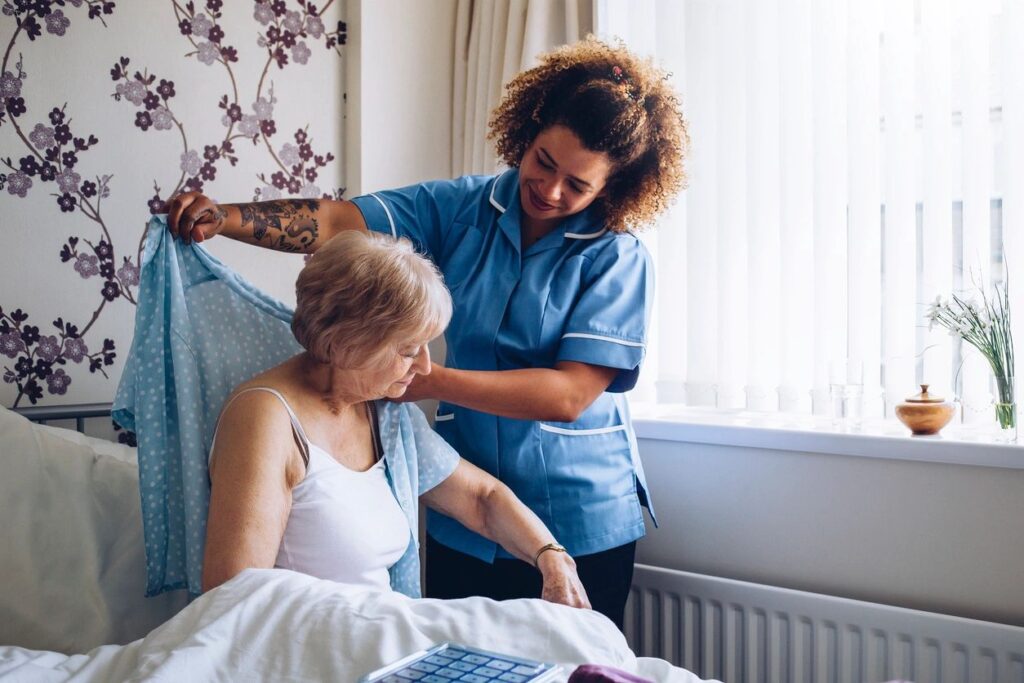Empowering Patients and Caregivers: The Importance of Education in Home Healthcare

Empowering Patients and Caregivers:
The Importance of Visiting Patient At Home
Empowering Patients and Caregivers: The Importance of Education in Home Healthcare
Home healthcare plays a crucial role in providing personalized and convenient medical care to individuals in the comfort of their own homes. Whether it’s post-surgery recovery, managing chronic conditions, or assisting with activities of daily living, Visiting Patient At Home services have become increasingly popular. However, to ensure the highest quality of care, patient and caregiver education is paramount. In this blog post, we will explore the significance of patient and caregiver education in home healthcare and its positive impact on patient outcomes and overall well-being.
Get Better With Algebra Healthcare

Your Good Health Is Just A Call Away Visit our Social Media & Read Blogs
Your Good Health Is Just A Call Away
+971 501 317 063 / 800 200 100

Visiting Patients At Home Empowering Knowledge
In-home healthcare is a collaborative effort between healthcare professionals, patients, and their caregivers. Educating patients about their conditions, treatment plans, and self-care techniques empowers them to actively participate in their own healthcare journey. When patients have a clear understanding of their conditions and treatment options, they can make informed decisions and take ownership of their well-being. Education can encompass a variety of topics, including medication management, wound care, mobility exercises, nutrition, and disease management strategies. By providing comprehensive education, home healthcare professionals equip patients with the necessary skills and knowledge to manage their conditions effectively, minimize complications, and improve their overall quality of life.
Supporting Caregivers for Optimal Care
Caregivers, whether family members or hired professionals, play a vital role in home healthcare. They often act as the primary support system for patients, assisting with daily activities, monitoring medication schedules, and coordinating with healthcare providers. Proper education for caregivers is essential to ensure they are equipped with the knowledge and skills necessary to provide optimal care. Caregiver education can include training on proper lifting and transferring techniques, recognizing and responding to changes in the patient’s condition, and understanding potential complications or adverse reactions. By arming caregivers with this knowledge, they can confidently provide care, effectively communicate with healthcare professionals, and promote a safe and supportive environment for the patient.
Enhancing Medication Adherence and Safety
One critical aspect of patient and caregiver education in home healthcare is medication management. Adherence to medication schedules and understanding potential side effects is crucial for successful treatment outcomes. Home healthcare professionals educate patients and caregivers about medication usage, dosage, and possible drug interactions. Moreover, educating patients and caregivers about medication safety measures, such as proper storage and disposal of medications, helps prevent accidents and ensure the patient’s well-being. By emphasizing the importance of medication adherence and safety, education plays a pivotal role in minimizing medication errors and adverse reactions.
Promoting Disease Management and Prevention
Education in home healthcare extends beyond immediate care needs and focuses on long-term disease management and prevention. By educating patients and caregivers about lifestyle modifications, symptom management, and early warning signs, home healthcare professionals empower them to proactively manage chronic conditions and prevent complications. Education can include strategies for exercise, nutrition, stress management, and recognizing warning signs of worsening symptoms. By equipping patients and caregivers with this knowledge, home healthcare providers empower them to actively engage in self-care and make informed decisions to prevent exacerbations and hospital readmissions.
Patient and caregiver education is an essential component of home healthcare services:
By empowering patients with knowledge, supporting caregivers, enhancing medication adherence and safety, and promoting disease management and prevention, education plays a significant role in improving patient outcomes and overall well-being. Home healthcare providers should prioritize education as an integral part of their care plans, fostering a collaborative partnership with patients and caregivers for a successful healthcare journey in the comfort of their own homes.
